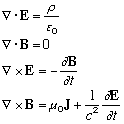
The nineteenth century produced a revolution in our understanding of electricity and magnetism, which culminated in the work of James Maxwell. These two phenomena, electricity and magnetism were once thought to be unrelated, until the work of such men as Oersted and Ampère, who deduced the laws by which electric current can create magnetism; and Faraday and Henry, who deduced the laws by which magnetism can create electricity. Now we know that electricity and magnetism are so closely related, that when physicists list the forces of nature, electromagnetism is usually counted as just one.
Maxwell's achievement was to take everything that was known on electricity and magnetism, and gather it all together in four equations:

(If you haven't had the three or four semesters of calculus necessary to makes sense of these equations, just sit back and gaze at their beauty for a few minutes.)
For our purpose, the important thing about Maxwell's equations is that in addition to describing everything people knew about electromagnetism, they revealed a few things that people didn't know. For example, it's possible for the electric and magnetic fields that make up these equations to travel through space as an oscillating wave. When Maxwell calculated the speed of these waves, he found that they travel at the speed of light. This is no coincidence; what Maxwell had discovered is that light is an electromagnetic wave.
The important thing to realize, then, is that the speed of light follows directly from Maxwell's equations which describe all of electricity and magnetism. And now we go back to Einstein.
Einstein's first postulate is that the physical laws of nature are the same in all inertial reference frames. His second postulate is simply a consequence of applying this principle to the laws of electricity and magnetism. That is, if Maxwell's equations are taken as laws of nature, then they (and all their consequences) must hold in all inertial frames. One of the results of this is Einstein's second postulate:
The speed of light is the same in every inertial frame of reference.
Einstein's first postulate seems perfectly reasonable. And his second postulate follows very reasonably from his first. How strange that the consequences will seem so unreasonable.